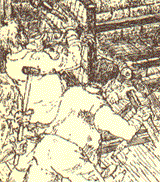 |
Luddites in Wakefieldquotes from Henry Clarkson and R D Woodall |
Back to Wild West Yorkshire nature diary
Memories of Merry Wakefield
An Octogenarianís Reminiscences
Henry Clarkson, Wakefield, 1887
Chapter IV
MERCANTILE WAKEFIELD
 IN
the year 1810, a great impression was produced on my mind, by the accounts
of the reckless proceedings of the "Luddites" --a lawless body
of men, who went about the country, to stop the introduction of machinery
in mills, breaking and destroying it, wherever they heard of its having
been erected. I believe they were named after a half-witted man, Ned Ludd,
who, in 1782, had broken some stocking-frames at Nottingham; the name
afterwards was applied indiscriminately to all breakers of machinery.
The first warning of their intentions was, usually, a threatening letter,
to the owner of a mill marked for vengeance; and, one of these was sent
to my father, who had recently erected some "mules" for spinning
by machinery, at his mill on the Alverthorpe road. This letter, to the
best of my recollection, was as follows:-' Mr. Clarkson, if you do not
immediately take down the machinery you have put up in your mill, for
spinning, you will have a visit from 'General Lud.'
IN
the year 1810, a great impression was produced on my mind, by the accounts
of the reckless proceedings of the "Luddites" --a lawless body
of men, who went about the country, to stop the introduction of machinery
in mills, breaking and destroying it, wherever they heard of its having
been erected. I believe they were named after a half-witted man, Ned Ludd,
who, in 1782, had broken some stocking-frames at Nottingham; the name
afterwards was applied indiscriminately to all breakers of machinery.
The first warning of their intentions was, usually, a threatening letter,
to the owner of a mill marked for vengeance; and, one of these was sent
to my father, who had recently erected some "mules" for spinning
by machinery, at his mill on the Alverthorpe road. This letter, to the
best of my recollection, was as follows:-' Mr. Clarkson, if you do not
immediately take down the machinery you have put up in your mill, for
spinning, you will have a visit from 'General Lud.'
Several mills had been set on fire and much machinery destroyed, and the Luddites were becoming, very much dreaded in this neighbourhood. Mr. Foster, the owner of a mill at Horbury bridge, had been threatened, and as a precaution, two of his sons were placed in the mill, to watch during the night. The Luddites came; broke into the mill, bound the two young men, hand and foot; broke the machinery, and set fire to the mill. I perfectly recollect walking over next morning, with my brothers, to see the wreck; and we spoke with the two young Fosters, who had been rescued. My father, as he lay in bed that night, heard the tramp of the feet of these men, passing over Westgate bridge, on their way to wreck this very mill. He had a further warning, a night or two either before or after this fire: he was in his room preparing for bed, when a large boulder stone was hurled through his window, accompanied by a significant message from General Lud, in the shape of a letter attached to the stone. He immediately seized a gun, which he always kept loaded in his bed-room, threw open the window, and stood ready to fire; but he heard nothing more. The name on the letters, it is said, was sometimes signed in blood. My father, thinking discretion to be the better part of valour, quietly took down his machinery after these unmistakable warnings, and laid it on one side, till the disturbances were over, when it was again set in motion.
A great resort of the Luddites for meetings and for their drill, was Grange moor-half-way between Wakefield and Huddersfield. Their outrages were carried to a very serious extent, and one murder was committed: that of Mr. Horsfall, of Longroyd bridge, who was shot on the road, as he was returning from Huddersfield market. The brave defence of his mill, by Mr. Cartwright, of Rawfolds-on which occasion one or two of the Luddites were killed,- has often been recorded. After this, fourteen of the Luddites were apprehended, and taken before Mr. Ratcliff, of Milnes Bridge, who was a Magistrate, and was afterwards knighted for his courageous committal of them; and whose portrait, painted by Owen, is now in the Magistrates' room, in the Court House, at Wakefield. The men were committed to York Castle, where they were tried, found guilty, and sentenced to be hanged; which was duly carried out. They were tried by the well known Baron Wood-a great uncle of my late wife's-and after he had passed the awful sentence of death, the counsel for the prosecution asked his lordship, if he thought the fourteen men should all be hanged on one beam ? when he quaintly replied, "he thought they would hang more comfortably on two!" This story was told me by my late old friend, Mr. John Bayldon, of Horbury, Solicitor, who was a distant relative of Sir George Wood.
Some Horbury Yesterdays
R.D.Woodall
1973
24.
LUDDITES, STRIKES AND INDUSTRIAL TROUBLES
Horbury like all industrial centres has had its industrial troubles.
In the French Revolutionary and Napoleonic war period (1793-1815) cost
of living shot up while at the same time the Industrial Revolution which
shifted weaving from the home into large mills was going on fast.
Steam engines for driving factory machinery were introduced in Horbury at Race's Mill at Dudfleet and in Foster's Mill, later owned by Messrs. R. Baines and Co., parts of which are now used by Messrs. Lee and Briggs as a store. The engine at Foster's Mill was put in in 1795. That is why the nearby road was named "Engine Lane".
In 1812 Yorkshire was affected by Luddite riots. These were machine breaking riots which had started in the East Midlands, when the rioters claimed they were followers of "General" Ned Ludd.
"The Whitehall Evening Post" of April 11 1812 reported that the rioters had surrounded Foster's mill. A body of armed men had entered the mill by a place where cloth was dressed. They had smashed the frames, shears and looms. The main body of men had gone into Mr. Foster's house, got his sons out of bed, tied them up and asked for the keys of the workshop.
The 300 odd Luddites are said to have marched "In regular sections to the assault". Having smashed the machinery, they then attempted to set the mill on fire.
The same London newspaper on April 14 1812 reported that the riot was so bad that there had been a request for soldiers to guard the other mills.
The Horbury Constable's Accounts for the period show the soldiers were housed in a 4 roomed barracks and that the rent for the 29 week period from July 6 1812 till January 25 1813 was £10. £1 appears to have been paid for four dozen knives and £5.9.11 to John Ruddock for candles.